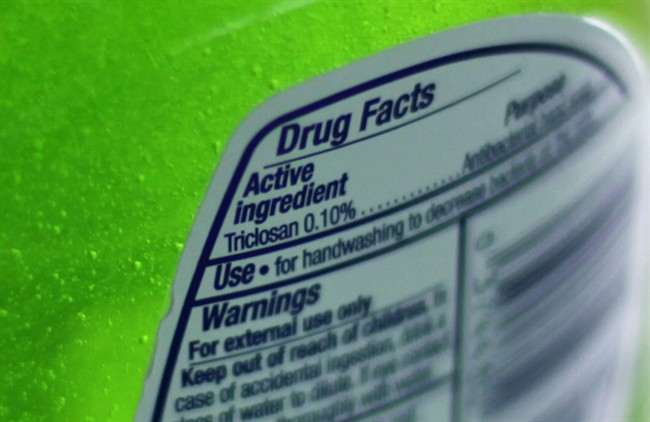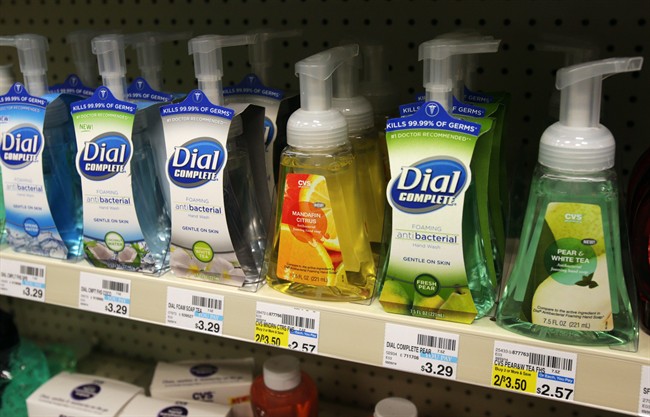Last week the U.S. Food and Drug Administration banned 19 ingredients in antibacterial soaps on the basis that there has not been any hard scientific evidence proving that they protect consumers against germs any better than ordinary soap and water.

But does that mean that antibacterial soap is bad for us?
READ MORE: USFDA bans antiseptic chemicals from antibacterial soaps
“Consumers may think antibacterial washes are more effective at preventing the spread of germs, but we have no scientific evidence that they are any better than plain soap and water,” said Janet Woodcock, M.D., director of the FDA’s Center for Drug Evaluation and Research (CDER).
“In fact, some data suggests that antibacterial ingredients may do more harm than good over the long term.”
The Centers for Disease Control and Prevention (CDC), based in Atlanta, Georgia, has been leading research in an effort to determine if antibacterial soap protects humans any better than using regular soap and water. Studies dating as far back as 2005 concluded that antibacterial soap made no difference.
But there are also concerns that antibacterial soap may not only be detrimental to humans, but also to the world around us.
“There’s the human health issue,” said Laura Hug, assistant professor at the University of Waterloo. “And there’s the fact that there’s no evidence that they’re dong anything different for consumers than just plain soap and water.”
But there’s an additional concern, she added: these ingredients — such as triclosan — are washed down the sink into the drain into our water system and purification systems that can’t deal with them.
“There are a number of concerns that people should have,” Hug said.
One of the processes used in water purification systems are microbial bioreactors. The microorganisms contained within help clean the water, reduce organic waste and more. Something like triclosan interferes with this process, as antibacterial chemicals enter the system and break down the microorganisms, rendering them useless.
Triclosan also has the ability to randomly generate mutations in bacteria. This could — and likely will — lead to antibiotic resistance.

Get weekly health news
“It’s random, but it’s inevitable,” said Hug.
Soap and water will do just fine
Christine Dupont, a lecturer at the University of Waterloo, explained why soap and water is just as effective — if not better — than antibacterial soaps.

“Soap and water is based on two things: the physical removal of things that are on the surface of the skin, and that probably includes dead skin cells that microbes might adhere to; and secondly, soaps are able to disrupt membranes so bacterial cells — and viruses as well — some have these membranes as well that soap can help disrupt.”
So why did antibacterial cleaners become so popular in households?
While some attribute it to the SARS outbreak of 2003, Dupont and Hug stress that SARS was a viral infection, so the antibacterial agents wouldn’t have actually protected anyone from anything.
The antibacterial agents do have their place, but that isn’t in our homes: they were originally meant to protect health workers from bacteria like staphylococcus aureus that can cause infections in hospitals and other health-care settings.
“That’s spilled over into households with marketing that says this is somehow better for you, though, clearly, most people don’t have staph aureus at home,” said Dupont.
“The media or marketing angle that was being used to market these were a bit disingenuous,” said Hug.
One of the additional concerns to the increased use of antibacterial soaps and cleaners in the home is that we could be eliminating the beneficial bacteria on our hands.
“When you wash your hands with soap and water, you’re removing the daily grime,” said Hug. “But if you wash your hands with … an antibacterial, that’s a much more difficult surface for your natural community to colonize.”
Our hands — our bodies — are home to many “good” bacteria that helps keep us healthy. But in recent years the idea that all bacteria are harmful has entered the public consciousness.
“The concept that all bacteria are bad pervades and has pervaded for a very long time, and in fact, the story is just the opposite: we absolutely need bacteria for our good health,” said Dupont.
What about Canada?
In light of recent developments and scientific evidence citing that antibacterial soap doesn’t make a difference, why hasn’t Canada followed suit?
READ MORE: Hand washing—6 steps to kill the germs on your hands
In 2014, a report from the Canadian Environmental Law Association suggested that both Canada and the United States should consider banning the use of triclosan and triclocarban.
In response to an inquiry as to whether the federal government would consider a ban, Health Canada said in an email statement to Global News: “The health and safety of Canadians is of utmost importance. Health Canada is aware of the FDA’s recent announcement regarding certain active ingredients in antibacterial soaps. In Canada, these products require pre-market authorization prior to sale on the Canadian market. A pre-market authorization is issued only after a product has been deemed safe and effective for use. The government will continue to monitor new scientific evidence related to triclosan and will take further action if warranted.”
Health Canada also specifically addressed triclosan.
“With respect to triclosan specifically, the final screening assessment report for triclosan under the Chemicals Management Plan will be published in the Canada Gazette, Part I in the near future. Health Canada will continue to monitor all safety information and take action if needed.”
And though the FDA may have banned it in soaps, triclosan isn’t banned overall: it can still be found in some toothpastes. That’s because its addition has been linked to improved protection against cavities.
Hug and Dupont would both like to see antibacterial agents banned in widespread use, as its effectiveness in soaps is questionable at best. And the harm that it could cause is of concern.
“It’s almost certainly bad for the planet and it’s certainly not good for us as we’ve been told,” Dupont said.


Comments